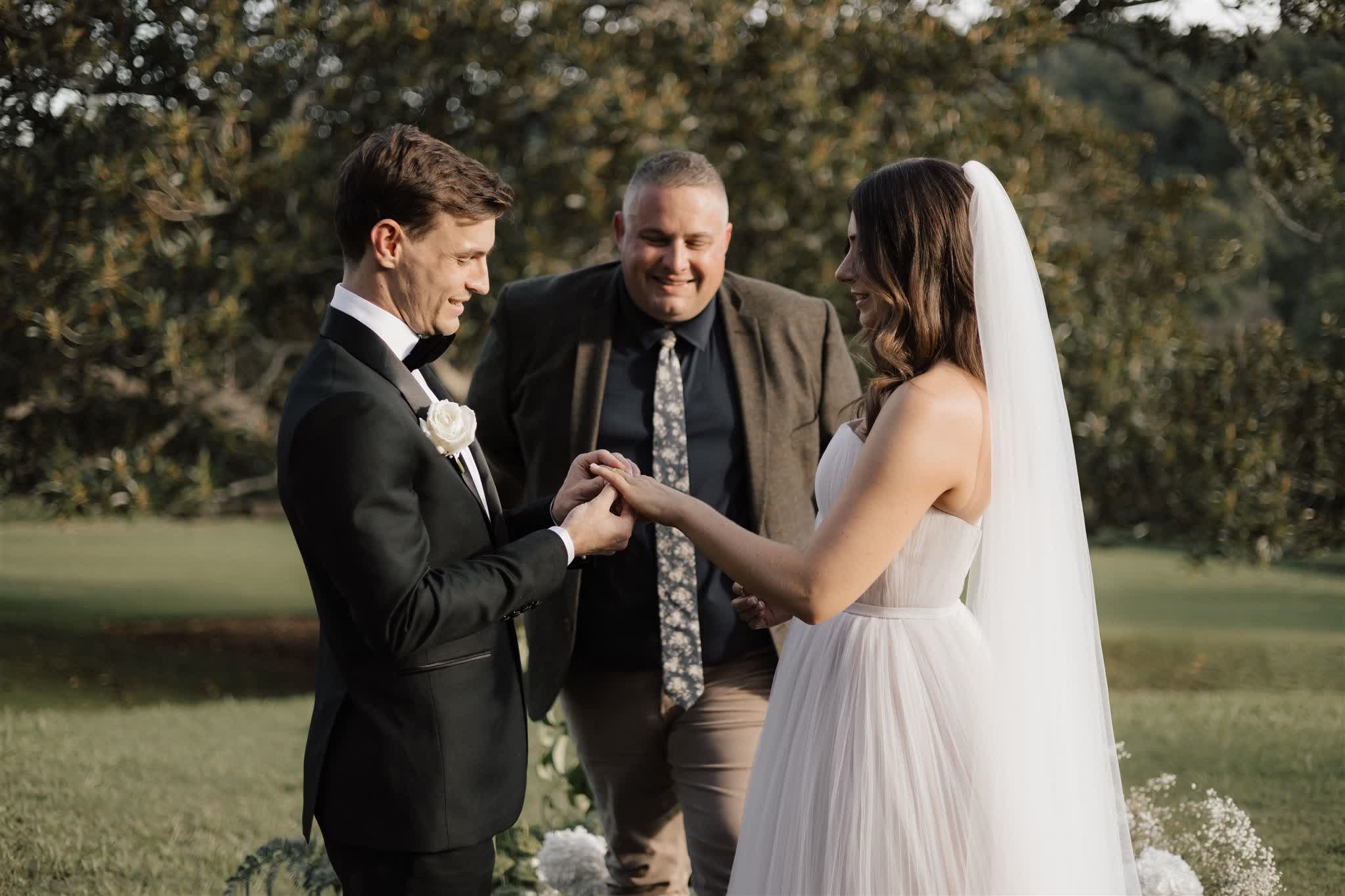I don't ask you to say I do, usually
Cuties call the ceremony the "I dos" bit of the day, which is cute, but it's actually not required and in many of my ceremonies I don't do it.
Everything you've ever wanted to know about wedding celebrants
I've been a wedding celebrant since 2009

FAQs
Celebrants have been creating weddings in Australia since the 1970s
A wedding celebrant is a trained and legally registered professional who conducts personalised marriage ceremonies in Australia. Unlike religious officials or registry office staff, celebrants work closely with couples to create unique ceremonies that reflect their personalities, values, and love story.
Civil celebrants conduct non-religious ceremonies and can incorporate any elements you choose, while religious celebrants must follow their faith's traditional ceremony structure. The beauty of choosing a civil celebrant is the complete freedom to design your ceremony exactly as you envision it. Want to include religious elements? That's perfectly fine. Prefer to keep things secular? That works too.
Registry office weddings are standardised, brief governmental proceedings that solely fulfil legal requirements. They last about 5 minutes, consisting only of mandatory legal vows without any personal touches - it's much like visiting any other government office. In contrast, a celebrant wedding breathes life into your marriage through personal vows and meaningful moments. The focus is on creating a beautiful beginning to your marriage, not just ticking administrative boxes.
The magic of a celebrant wedding lies in its ability to truly reflect who you are as a couple. Your ceremony can be as traditional or unconventional as you like, held anywhere you choose, and include elements from multiple cultures or beliefs. The ceremony sets the tone for your entire wedding day - it should be the highlight, not just a formality to endure before the reception.
Australian celebrants must complete a Certificate IV in Celebrancy, register with the Attorney-General's Department, and maintain annual professional development. This ensures a thorough understanding of marriage law and ceremony requirements, along with skills in public speaking and ceremony creation.
While Australian law only requires one month's notice for marriage, popular celebrants often book 12-18 months in advance, especially for peak wedding seasons. Early booking ensures you can secure your preferred celebrant and gives ample time for ceremony planning.
The process involves meeting as many times as needed until everyone feels comfortable and confident about the ceremony plan. It's about creating the perfect atmosphere and ensuring the ceremony truly represents your commitment and future together.
Absolutely! Civil ceremonies can incorporate any cultural traditions, religious readings, or spiritual elements that matter to you. The joy of a civil ceremony is its ability to blend different cultural backgrounds while remaining authentic to your beliefs.
Australian celebrants are directly appointed by the federal government and operate under strict professional standards. They handle all legal responsibilities, including paperwork and marriage registration, providing a more comprehensive and regulated service than many international counterparts.
A celebrant ceremony isn't about recounting dating history or farewelling single life - it's about your future together. The focus should be on what your marriage means and where you're heading as a couple. The best ceremonies are about breathing life into your marriage as you stride boldly into the future together.
Personal vows are absolutely crucial - they're the words that breathe your marriage to life. Your own authentic, personal promises create a powerful foundation for your marriage and make your ceremony uniquely meaningful. The legal vows are important, but it's your personal vows that truly mark the beginning of your marriage.
A great ceremony can be created in under 18 minutes, though religious and cultural rituals or specific couple requests might extend this time. In comparison, registry office ceremonies are purely administrative, lasting about 5 minutes. The length should serve the ceremony's purpose, not dictate it.
A great celebrant connects with their couples, listens actively, communicates clearly, and shows genuine interest in their vision for the future. Look for someone who blends professionalism with warmth and creates an atmosphere that reflects your commitment.
There's real beauty in experiencing your ceremony fresh alongside your guests, allowing the moments to unfold naturally and authentically on your wedding day. A skilled celebrant will ensure everything flows smoothly without the need for rehearsals.
The best ceremonies focus on your future together, creating a meaningful celebration of what your marriage means and where you're heading as a couple. Rather than dwelling on the past, they articulate and celebrate your shared values and vision for the future.
Celebrant fees cover planning meetings, ceremony creation, travel to your venue, ceremony delivery, and all legal documentation and registration.
Absolutely! A ceremony can include meaningful roles for family and friends through readings, rituals, or cultural traditions, while maintaining a beautiful flow throughout the celebration.
Real and genuine help in having the best wedding
Cuties call the ceremony the "I dos" bit of the day, which is cute, but it's actually not required and in many of my ceremonies I don't do it.
Fight Club was a powerful movie and today it's got me thinking about weddings, and houses full of condiments but no food
Need to marry in less than a month in Australia? Learn how shortening of time for your NOIM works, the 5 qualifying circumstances, and how to apply.
Bring some peace and clarity into your wedding planning process with my new Wedding Budget Calculator app right here on my website.